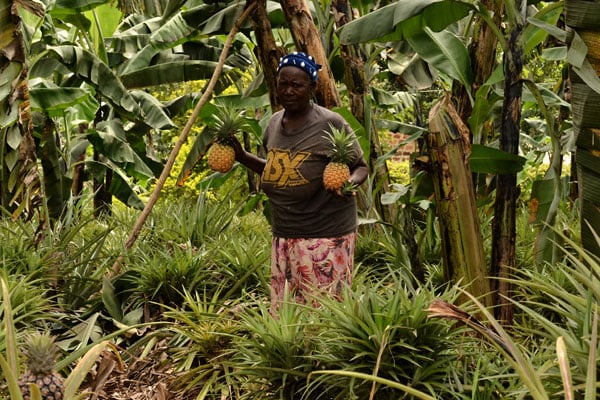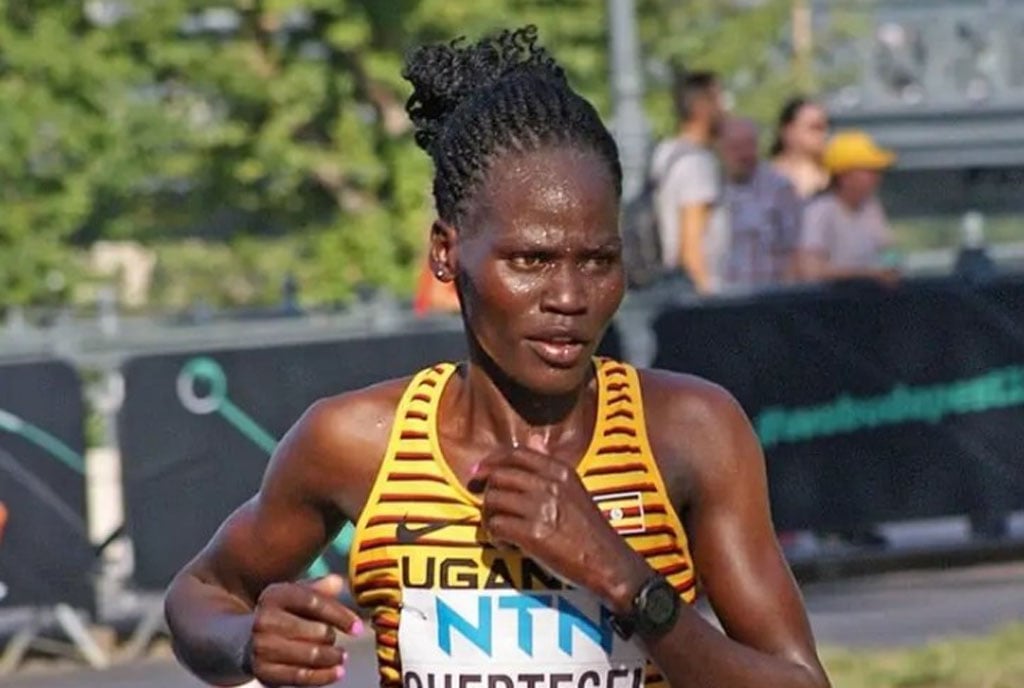Prime
Lessons from Mukono’s model farmer

Baziyaka in her banana plantation intercropped with pineapples. Photo / George Katongole
What you need to know:
- Recruited to serve as a volunteer model farmer in Lwanyonyi village Nama Sub-county, Mukono District, Baziyaka helps train others in her village. She has two cow shades and numerous demonstration plots for vegetables, maize, beans, cassava, sweet potatoes and ground nuts, among others, where new farming approaches have been tested. Local farmers have over the years come to learn from what she is doing.
When Florence Baziyaka, 70, shows visitors a section of her 10-acre property, she keeps a visitor’s book close by with details of the numerous people that stream to her homestead to learn about how she is going around her farming business.
On her farm, the banana plants, occupying an acre, are tall with green lush leaves mixed with fruiting pineapples.
The plantation is aesthetically maintained in pristine condition. She points to one section: “Pasture for my cows is grown over there,” she says.
“That one-acre piece of land was planted in 2002 in preparation to receive a cow from Send a Cow Uganda and I have been taking care of it until to date keeping it in top condition with manure from the cows.”
Just close to her main house, stands two cow shades while on the side are rental houses. “All this has been out of my efforts as a farmer,” a beaming Baziyaka says.
Partnering for success
Recruited to serve as a volunteer model farmer in Lwanyonyi village Nama Sub-county, Mukono District, Baziyaka helps train others in her village. She has two cow shades and numerous demonstration plots for vegetables, maize, beans, cassava, sweet potatoes and ground nuts, among others, where new farming approaches have been tested. Local farmers have over the years come to learn from what she is doing.
Baziyaka has been able to train farmers on farming including farm planning, sustainable organic agriculture, mulching, kitchen gardening, improved animal management and conservation livestock feeding.
Baziyaka is one of many smallholder farmers who benefitted from weekly self-help training from Twekembe Kirangira Women Farmers’ Group. The association is aimed at helping farming families improve their agricultural production, improve their diets and reduce malnutrition, especially in families with young children while encouraging savings.
Resource mobilisation through Twekembe Kirangira Women Farmers’ Group remains the core of the association’s approaches. More than 35 members that make the association participate in routine training and have developed savings and credit initiatives to help access credit internally. Those that excel attain the status of peer farmers.
Initially, she was a peasant farmer growing crops such as maize, potatoes and bananas, among others solely for family consumption.
As a widow since 2013, Baziyaka struggled to support her family especially after her husband was bedridden for 23 years.
Although she has just two children, she provides for several dependents while offering employment to two permanent workers and many casual labourers during the weeding or harvesting time.
Her role as a model farmer has changed Baziyaka’s status in the community, commanding respect from her peers.
Dorothy Nakalembe, the chairperson of Twekembe Kirangira Women Farmers’ Group recruited Baziyaka into the Send a Cow project and offered her one dairy cow.
Send a Cow Uganda, is a livelihood improvement development organisation that came into existence in 1988 by Christian dairy farmers in the UK to help combat poverty following more than 20 years of civil strife.
Send a Cow works with vulnerable women and girls, the youth, orphaned and vulnerable children, widows and PWDs organised in self-help groups with a mission of giving communities and families the hope and the means to secure their own futures from the land.
Send a Cow Uganda shared 32 cows to begin with that were sent to Uganda on July 4, 1988.
Farmers that were supported at the beginning, went on to help others by ‘passing on’ the first female offspring of their livestock equivalent to what they received.

Baziyaka attends to her cows which she says are a great source of income and farm input for smallholder farmers. Photo / George Katongole
Baziyaka was among those chosen to benefit from the parent stock before passing on a gift.
Nakalembe says that Baziyaka’s abilities in farming are changing the way people see her: “Some people used to despise her since she came into this marriage from another failed one. But now other farmers respect her because they learn a lot from her,” Nakalembe, a peer farmer, says.
Making the difference
Baziyaka points out just two of the things that are making a big difference for her now: The first is adopting the four-acre model of farming that was introduced by President Museveni with focus on commercial agriculture among people with small pieces of land.
Under the four-acre model of farming, a farmer can use one acre for cash crops such as coffee; allocate another acre for fruit production, the third acre for dairy production, on which for example, pasture (elephant grass, legume and others) can be grown and one dairy cow kept and the last one for food crops.
These enterprises are interdependent where the cow can produce manure for the farming activities as well as the coffee husks to address the challenge of fertiliser use and poor soil conditions. The system also emphasises maximising the benefits through intercropping.
“This model ensures that the farmer gets maximum benefits from farming,” Baziyaka explains.
The other major improvement is the intercropping of bananas with pineapples.
This is an approach that minimises disturbance of the soil as manure and coffee husks applied to the pineapples benefits both crops. It thus saves labour, an important factor for an aging widow like Baziyaka. Instead of having to weed several times a season or apply chemicals to kill the weeds, she lays mulch around the pineapple plants, which suppresses weed growth while retaining moisture.
She is grateful for this technique as it eliminates a lot of costs that would have gone into labour: “I would be spending more if I had to do all that weeding. But with one acre, the costs of weeding banana and pineapples are combined,” she adds.
Since she started the inter-cropping practice, she is seeing a big difference in her incomes. She harvests more than 40 bunches weekly while harvesting the pineapples up to thrice in a week during the season.
“At the farm gate price, I sell each pineapple at Shs1,000. I don’t need to go out looking for customers. They come directly to the farm, even those that need the bananas,” she says.
But she explains that intercropping bananas with pineapples is important because when the pineapples dry up, you can sell the suckers to other farmers while turning to the bananas.
On average, she earns Shs20,000 daily when she has one milking cow. She keeps a maximum of four milking cows.
Even with her status as a model farmer, she still encourages others to go for farm visits.
For successful farming, Baziyaka tips farmers to constantly stay in touch with extension workers and stresses the importance of maintaining bio safety in dairy farming.
“Farming keeps evolving and it is important to know the latest trends through the extension workers. Farmers must be updated with knowledge,” she explains.
Roots in farming
Her family grew food crops, especially cowpeas, sorghum, banana, Irish potatoes on the highlands of Kabale. In marriage, she used to farm with her husband on a subsistence level.
“I grew up in a rural area, where eating food from our fields was the norm. Even later, when I married, farming was a way of life,” she explains.
Most smallholder farmers’ incomes are spent on paying school fees for children, acquisition of household items such as solar kits, motorcycles, land and bicycle, buying small livestock such as goats, chicken, turkeys or even local bulls for fattening, building new houses or improving on existing ones, paying medical bills, purchasing agricultural inputs, buying food for the household and business investment.
She says that agriculture is the reason she is happy. Baziyaka wants to ensure that her efforts make a meaningful contribution to farmers in the country.
“Through farming, one can turn around their lives. It was farming that helped me construct a new house and pay medical bills for my husband for that long period of time. Like we have been taught, farming should be looked at as a business,” she notes.
She has also added three acres in Kayunga to the 10 acres she owns in Lwanyonyi.
“With this small field, I have fed my family and helped feed many others that buy products from me including milk,” she says.
Even though there is growing concern to add value to crops, Baziyaka explains that even the local market is still big enough.
“People in our communities still need to be fed. The big farmers can go commercial in their operations but for us it is important to feed our people. There is great demand,” she says.




